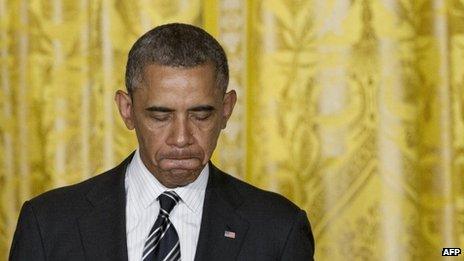Obama's half-hearted push into Syria
- Published
- comments

You can't please all the people all the time. But sometimes you can disappoint most of them.
For those who have welcomed President Barack Obama's reluctance to embroil the US in Syria, he has just taken a step deeper into the mud.
But those who think his policy has so far been lily-livered and hesitant will only applaud slowly, and without much enthusiasm. They will argue he is still doing too little, too slowly.
The basic news from the White House is pretty clear - they are now sure Syrian President Bashar al-Assad's regime has used chemical weapons against the rebels. That crosses President Obama's red line, and changes his calculus.
What that adds up to in terms of action is a bit mistier.
The talk for months, years perhaps, has been whether the West will "arm the rebels".
Weapons wish list
The White House could have used the same phrase but Deputy National Security Adviser Ben Rhodes repeatedly ducked it. Instead, he said the US had already increased the "scope and scale" of its assistance to the opposition including "provision of assistance to the Supreme Military Council in Syria" including "direct support to the military option on the ground".
He said, "I can't go through an inventory of the type of assistance we are providing but suffice to say it's going to be substantively different from what we were providing."
The man in charge of the Supreme Military Council, Gen Salim Idris, is less coy about revealing his wish list.
According to the Wall Street Journal he wants "200 Russian-made Konkurs antitank missiles and 100 shoulder-fired antiaircraft weapons known as Manpads. He also asked for 300,000 rounds of Kalashnikov ammunition, 100,000 rounds of rifle ammunition, 50,000 rounds of machine gun ammunition and high resolution satellite imagery".
At home, Republican Senator John McCain has said the president hasn't done enough.
"Obama should understand that just supplying weapons is not going to change things on the ground," he said. "The Free Syrian Army needs heavy weapons to counter tanks and aircraft, they need a no-fly zone, and Assad's air assets have to be taken out."
Right and wrong
Ben Rhodes is clearer about that option - it is not a good one.
He said a no-fly zone would be complex with no assurance of success and "great and open-ended cost for the United States".
But Mr Obama is inching toward greater involvement and next week's G8 will be interesting and important.
This is a very hard call for Mr Obama. He knows his country doesn't want to get caught up in another war. However, many in the West see this as a simple contest of right and wrong. It also has aspects of a regional Sunni/Shia civil war that could spiral out of control.
He almost certainly feels that such involvement would in the end not enhance the name of the US in the region.
But there are pressing humanitarian arguments to stop this now and to make sure those the West sees as the good guys win, before Islamic militants claim victory.
Mr Obama is at the helm of the country to which the liberal interventionists look to provide a lead. It is worth noting that you don't hear the same cries of "something must be done" from Brazil, China or Sweden.
But many politicians in Britain and France still feel a heavy imperial burden to use their well-honed militaries to re-make the world.
Mr Obama, I am sure, feels no such imperative but increasingly finds himself pushed towards acting. Thursday's statement feels half-hearted - because it is.